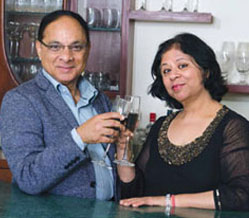
Sarita and Vinod Sawhny - she a corporate communicator with the Confederation of Indian Industries (CII) and he a veteran consumer, telecom and retail professional now turned advisor to entrepreneurs, show how one can build on both commonalities and differences and foster an energetic and harmonious life together
‘I just felt there was some magic in the way he talked. For me, how one talks and communicates matters a lot because it’s important for having any intelligent communication’
While Sarita, a student of psychology and mass communication from the University of Bangalore, is a trained journalist-turned-corporate communicator, currently works for the Confederation of Indian Industries (CII), Vinod is a hard-core Consumer, Telecom and Retail professional. He has worked in top positions in some much respected companies like Godrej GE Appliances, Spice Communications, Bharti Retail, Bharti Airtel and Reliance Communications. He currently enjoys his new avatar as Senior Advisor to new-age entrepreneurs in the telecom and such other sectors, out to change the Indian corporate scenario.
Sarita and Vinod are both very articulate, and specialists in their respective fields. Though they possess very different traits and have firm opinions about everything, they have found innovative ways to maintain a happy married life and strike a decent work-life balance. Corporate Citizen spoke to this amazing dynamic duo whose energy and passion for excellence makes you realise that despite differences of opinion, you can still have a successful marriage and balance high-powered careers.
No, there weren’t any violins playing in the background, nor any romantic dialogue baazi but, in their very first meeting, something happened and they knew they had met their partner for life.
“No, nothing of that kind happened,” confesses Sarita. “I just felt there was some magic in the way he talked. For me, how one talks and communicates matters a lot because it’s important for having any intelligent communication,” Sarita explains.
That, however, wasn’t crazy, because most journalists are sensitive to the way one talks. But what was really crazy was that they had come from all possible directions to have this meeting which changed their lives forever.
How? Explains Vinod, “I’m a Kolkata lad who was working for Godrej in Mumbai, while she’s a Bengaluru girl who at that time was working for Sunday Herald and we were both meeting in the North because her aunt and my grandma were very good friends,” recalls he with a smile.
But what did Vinod like in her when he saw Sarita for the first time? “See, I’m a Capricornian. I’m very earthy and so it’s very difficult to pinpoint what I liked in her. It was just that there was some degree of congruence— the way we conversed, our likes and dislikes and our priorities seemed to match. So I think that’s what brought about the click.” He then quickly explains it further, “I’ve always been a very career-focused person who believes in excellence and works for perfection and innovation because that’s what I like. In this whole quest for perfection, I found we both seemed to resonate on many things and that resonance became what you call attraction.”
That means even if it wasn’t love at first sight, there certainly was some mutual liking at first sight. “Oh yes,” chips in Sarita, “He was on work in Delhi. I was also there because my elder sister was going to deliver her daughter and I wanted to be with her during her delivery. One day when everybody said, let’s go to maasi’s place for tea, I also went there just like that. They also came there and that’s how we met. But it wasn’t like those formal rehearsed things that you see in Bollywood movies.’’
What did the conversation revolve around? Says Sarita, “Nothing very significant, but in the process we discovered that my father-in-law-to-be and the person closest to my father were very good family friends. He and my father-in-law turned out to be not just school friends but they had also worked in the same company for years. So, in this way, we discovered that there were many commonalities. One thing led to the other and things progressed. The families also hit it off well and before I knew it, our roka was done. We met in December-January of 1985 and on February 24, 1986, we got married.”
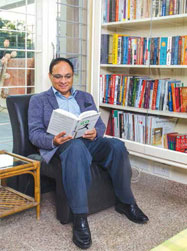
Recalling those good-old days of courtship, Sarita recalls,“We exchanged a lot of letters and cards. He would also come down to Bengaluru occasionally, though on work, but we’d meet and all that was very nice.” Going down memory lane, she adds rather thoughtfully, “It’s been more than 30 years since our wedding and life with Vinod has generally been wonderful!”
‘I’ve always been a very career-focused person who believes in excellence and works for perfection and innovation. In this whole quest for perfection, I found we both seemed to resonate on many things and that resonance became what you call attraction’ -Vinod
What happened after their marriage? Could she continue with her job with the ‘Deccan Herald’? Sarita interrupts, “No, when I left Bengaluru, I said goodbye to DH because it’s a Bengaluru-based paper and there wasn’t much that I could do from Mumbai except for writing Middles occasionally.” Going a bit nostalgic, she adds, “I still have very fond memories of DH because 30 years ago, there were very few women in the profession. It was a very caring and nice set-up. Even when I’d work in the evening shift, my dad would pick me up and drop me.
So when I moved to Godrej Colony in Mumbai, it took me some time to get used to the idea of living together in a marriage, that too in a different city, plus managing on one's own because we were also setting up a unit on our own. We were not staying with parents or family. So, I took my own time to entertain the thought of taking up a job. But once things fell in place, I recalled that my father was a member of Diner's Club and we used to get their magazine called ‘Signature’, published by Parsiana Publications belonging to Mr Jahangir Patel. Once earlier, while I was in Bengaluru, I had written a letter to them that I would love to join them. They replied that since they were Mumbai-based, they only took on locals.”
Continues Sarita, “When I’d moved to Mumbai, I just thought of exploring that option. When Vinod went on a tour for a week, with some difficulty, I rang them up and reminded them of my correspondence a year back. Luckily for me, one of their staff was going on maternity leave and they were also looking for somebody, so they asked me if I could meet them quickly. I said, yes, though until that moment, it didn't even occur to me that I was supposed to ask or consult or discuss it with Vinod. I just felt, this is what I want, and I'm going to do it. Then I thought, how will I reach VT, because I had never travelled in Mumbai’s local trains. So, when Vinod came back from the tour, I said, I want to go to VT to meet these people. He said, that’s great, but only if you can manage it. So, the next day, we went there, met them and I started working for ‘Signature’.”
“Instead of writing features, restaurant and book reviews which were my forte in the DH, here I had to get more involved with travel and life-style writing. Later, in 1992, when they gave up ‘Signature’ and launched their own magazine called ‘Voyage’ an out and out travel magazine, I continued with them.”
“But a year and half later, when our son Arnav came along, I took leave because I've always taken time-off from work whenever I thought it was needed. Writing is a profession you can practice pretty well from home too. So, after he was born and till he went to college, I didn't work full-time. I’d come home by 3:30 and do the rest of my work from home. I had that flexibility because thankfully magazine journalism allows you that. In those days, we used to edit by hand. I also remember the first PC when it came. I've even worked on typewriters and seen those beautiful days when typesetting in newspapers was also done by hand.”
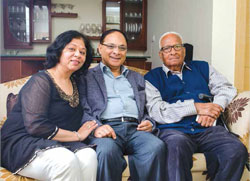
Post-marriage, how has been their respective career journeys? Answers Vinod, “For me, it was wonderful and very clear. At the time of my marriage, I was with Godrej which became Godrej-GE and, from 1983 to 1999, I worked with them for 16 years. Then I moved to the telecom sector, went to retail and then again went back to telecom. When I joined Bharti Airtel around 2002, we found that people were not so hungry for journalism. So, she moved to the CII and has been there for almost 16 years now. What I like about her is that she has maintained a very fine work-life balance and always kept her home priorities-- which are to her in-laws, to me and to our son-- above her career.”
Adds he, “All these years we’ve always had something nice to discuss every morning and evening which is of common interest. We're not the typical ‘wife plays the wife and husband plays the husband’ kind of couple. We have common subjects to talk about.’’
"Actually when I joined CII in Chandigarh, I hopped across from journalistic writing to writing for Corporate Communications for a good four five years. Instead of interviewing people, I was dealing with the Press working on the other side of the fence,” Sarita explains.
She adds, "But besides dealing with the media, I also started bringing out CII’s monthly magazine. When Arnav appeared for his class X and XII board exams, both times, I took three-month sabbaticals.
Says Vinod, “I joined Godrej in 1983 and stayed with them till 1999 and out of the 16 years, for at least 13 years, we lived in Mumbai. So, Mumbai was like home.” Adds Sarita, “Except for three years when we moved out and then went back, we’ve lived in Mumbai. Though our son was born in Bengaluru he was also raised in Mumbai.” In that sense, we are more Mumbai guys. We became Delhi-ites only when I joined Bharti Airtel in 2002 and then I shifted to my parents’ house in Gurgaon,” Vinod points out.
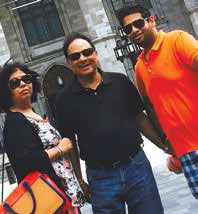
Sarita reminisces with nostalgia, “I thought, since there are so many options available in Gurgaon, maybe I can try something new because by this time Arnav was also going to university for his engineering studies. But in just two months, when I’d settled down a bit in Gurgaon, my boss from Chandigarh rang me up and said, ‘How long does it take to set up a house and put up curtains, etc? You had enough time to do all that, but now we want you to please report to the Gurgaon office and start working without any further delay.’’ So that’s how I’m back again at the CII office here in Udyog Vihar.
All these years we’ve always had something nice to discuss every morning and evening which is of common interest. We’re not the typical ‘wife plays the wife and husband plays the husband’ kind of couple’ - Vinod
“He has finished his studies and is now working in Amsterdam,” Sarita says. Vinod adds, but with a little pride, “Post-schooling, he has done all his education in the US. He has done his engineering from Purdue and management from an Ivy League business school, Cornell University. Now he is working in the Netherlands and that gives us more time for our careers.
Despite facing huge work-life pressures, more and more women are taking up professional roles. So, what do they feel about this changes at the work place? This time, Sarita takes the lead. She says, “I think the pressures were always there, maybe of a different type. In terms of conveniences also, things were different because there were not many available as you’ve now. For example, I’m a person who loves to cook and serve home-cooked food on the table but now you have so many options. In terms of practicalities, you’ve get the mixes and such other things, you’ve got the dosa batter and these things were not available easily in those days. Moreover, with so many working women around, the general understanding of their issues has also gone up. But in my time, aunties would say that if you’ve to work, why don’t you become a teacher. Bachhe ke saath jao aur usi ke saath vapas aa jao. But every woman in the world should not become a teacher. So, things have changed a lot for women today and while there is more empowerment of women today, respect for women in the sense of security and comfort which a woman feels is less now than it was then. Somehow, women are not given that kind of respect and it’s more of a socio-economic kind of thing. Otherwise, opportunities are so much more today that you don’t need to become a teacher or a nurse or a doctor because there are so many careers opened today that you can pursue what you really want to become.
Sarita says emphatically, “Very much so. I’m very happy. The glass ceilings have shattered and this is the happiest thing in the world, though in the corporate world, I feel, the women are not there as much in numbers as they should but nevertheless some beginnings have been made. But in banking sector, I see a lot of women doing pretty well. But things are changing. You’ve Chanda Kochhar, Naina Lal Kidwai, Arundhati Bhattacharya, Shikha Sharma and lots of others who’re sitting on top positions. And now, even in the combat roles of the armed forces, we’ve women doing wonders.”
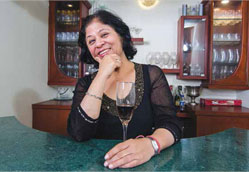
Adds Vinod, “In the consumer sector also, women have made a lot of mark. You’ve Vinita Bali at Britannia and many others but in the banking sector, whether it’s Stanchart or HSBC or SBI or ICICI, they’re doing extremely well and heading really big organisations.”
“What is really encouraging is that today men are also sharing a lot of home duties with them in terms of cooking meals or changing the diapers of the kids and so on and so forth,” Sarita adds.
“But you also see that the HR policies of the organisations have also become very women friendly in terms of relaxed maternity leave and work from home kind of thing. Everything has got aligned to the fact that both men and women pay equal roles and that’s the new thinking which is very welcome change,” Vinod concludes with a twinkle in his eyes.
‘For matters related to finance, I know he’s the best, so I don't even step in there. But for stuff like running the house, it's mostly me, though occasionally he also indulges in that’ - Sarita
Whose writ runs in the house? Who calls the shots at home? Vinod smiles, “You don't have to ask that question. Women are always bosses in their house, Right?” Sarita disagrees. “No. Not right, not right,” she asserts because “There is always a clash of opinions in our house.” Vinod then adds, “Let me comment on that. She has a view on everything and so do I. There are differences of opinion also. But I don't think they turn ugly. I think one of us relents.”
Sarita again chips in, “No. In matters related to finance, I know he’s the best, so I don't even step in there. But for stuff like running the house, it's mostly me, though occasionally he also indulges in that.” Vinod interrupts, “I think even if it's a matter of house, I can add value to it because I don't keep a distinction between a woman's role and a man's role. For professionals, equally qualified, with right thinking, I don't think we can we can box a woman into a particular role and a man into another,”
What is his basic philosophy of life? “I like things in action. I like stature. I embrace change. I love energy, change, and momentum,” declares Vinod.
Adds Sarita, “At this age while most people retire and slow down, he’s gone hyper active. He always used to say ‘I want to retire and I want to put my feet up and then we’re going to travel the world and do this and do that’. But now all that has become a big dream.”
by Pradeep Mathur